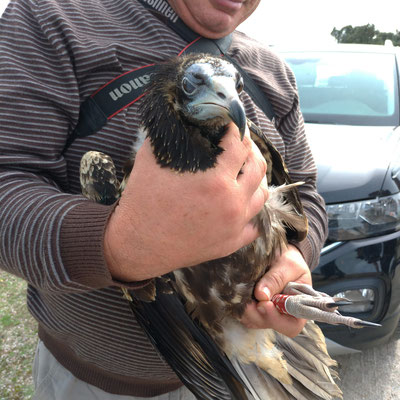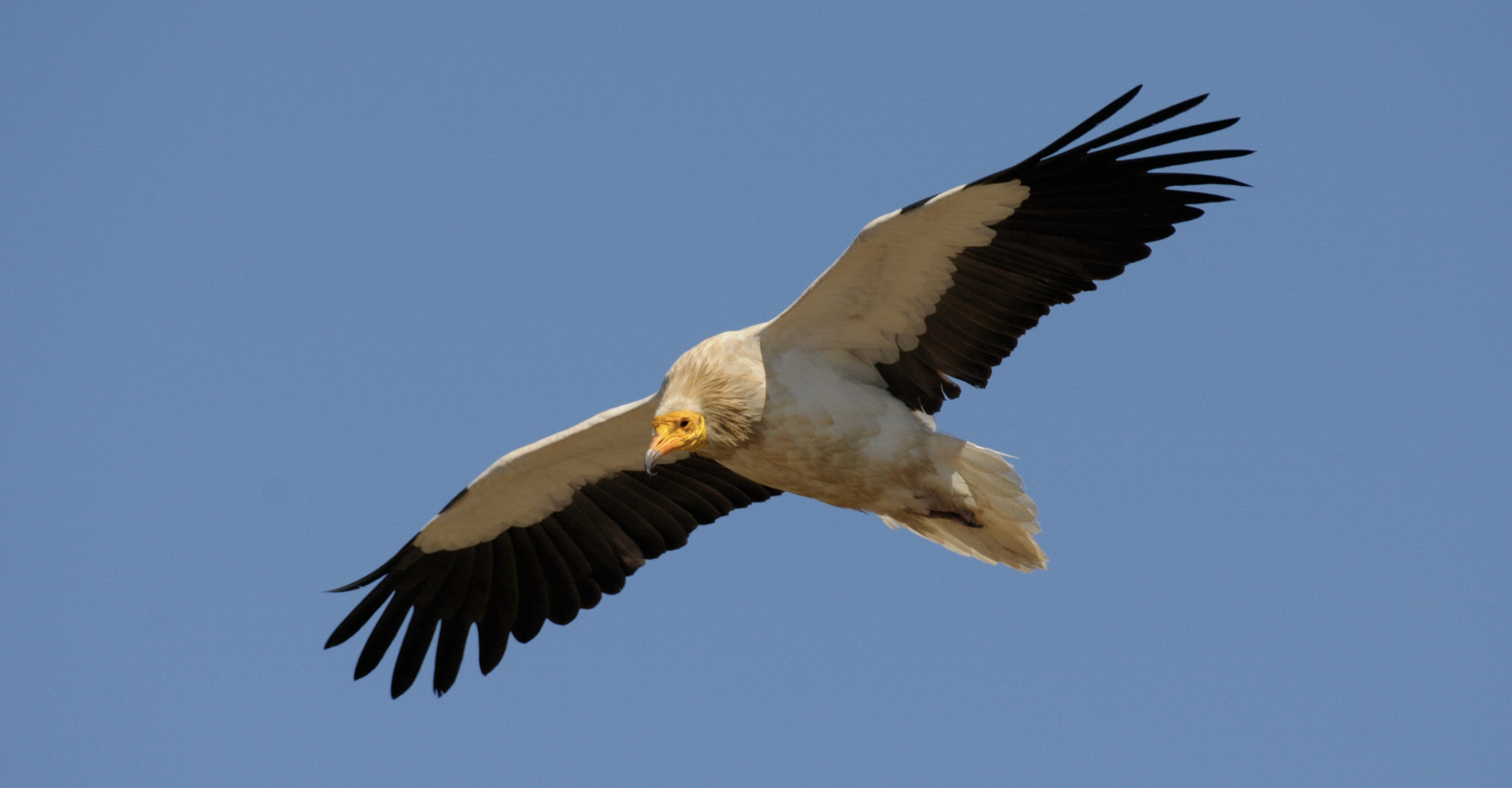
Thanks to effective cross border collaboration between NGOs and governments in Portugal and Spain, a young Egyptian Vulture has been given a second chance at life! The young vulture was found weakened in western Portugal and has been fully rehabilitated and now released near Acehúche, Cáceres, Spain, the only wintering area for the species in Europe.
Rescue and rehabilitation
The vulture was found weakened and disoriented in a very densely populated area in northwest Portugal, outside its normal range. The bird fledged from a wild nest this summer but got lost when starting its first migration and headed to an area with little food.
Found by members of the public, the bird was given to the environmental unit of the Portuguese police (SEPNA-GNR), and then taken to the Veterinary Hospital of the University of Trás-os-Montes e Alto Douro for rehabilitation. After almost two months in recovery, the vulture was healthy enough to return to nature!
Release
On Thursday 31 October, the Egyptian Vulture was freed to soar the skies again! Thanks to effective and rapid collaboration and coordination among organisations and governments from Portugal, Extremadura in Spain and us here at the VCF, all the paperwork and permits for the transfer of the bird to Spain were secured, and the vulture – aptly named Iberia – was released next to the main wintering area in Europe, in Extremadura, not far from the border with Portugal.
Jesús Moreno, the director general for sustainability of the regional government of Extremadura, Luisa Jorge, from the ICNF – the Portuguese government’s statutory conservation agency, and other staff from Portuguese and Spanish NGOs were present at the release of Iberia – in a very relevant example of effective and swift transborder cooperation for the conservation of vultures. These birds often use several countries in their migration or exploratory foraging flights, and thus international cooperation is essential for their long-term conservation, as it has been recognised in the Vulture Multi-Species Action Plan (vulture MsAP), the global blueprint for vulture conservation, co-developed by the VCF, and which has been formally endorsed by more than 100 countries signatories to the Convention for Migratory Species (CMS).
Ahead of its release, Iberia was fitted with a satellite transmitter (provided by us, and funded by the MAVA Foundation) to monitor its movements. Thanks to the transmitter, we are now observing the fascinating movements of the vulture. Contrary to what we expected, Iberia did not stay with the other conspecifics at the well-established wintering site and left after a few days towards the southeast. It took a south easterly route and missed Gibraltar, and arrived at the Mediterranean coast near the town of Cartagena. Then today (8 November) it flew south towards North Africa. Our team was following the movements of Iberia in real time, and a tense couple of hours followed. Iberia was flying relatively low (at 340m above sea level), but managed to get uplift twice over the sea (up to 750m and then to 960m), and made it to Algeria in 2,5h – a 200km crossing, meaning it made it with an average speed of 80km/h. Iberia is a champion! Let’s hope it will now make its way safely all the way to the normal wintering grounds in Africa.

Egyptian Vultures in Extremadura
The Egyptian Vulture is unfortunately still considered endangered on a global scale according to the IUCN’s Red List of Threatened Species. Spain has the biggest breeding population in Europe, with around 1500 pairs. Of which about 160 breeding pairs occur in Extremadura. The number of wintering birds in Cáceres now exceeds 130 in a restricted areawhere extensive sheep, goat, and pig farms are present, and therefore with plenty of food available.
Shift in wintering behaviour
Since the 80s, small numbers of Egyptian Vultures – a migratory species normally wintering in Africa, have started to winter in Extremadura the, maybe due to the milder winters and high food availability. The area has low human population density and is in the centre of the province of Cáceres, between Plasencia and Coria. It is the only wintering population in Europe, and it has been slowly increasing in numbers – in the last years up to 130 Egyptian vultures spent the winter months there.
Several birds were caught and tagged there several years ago, and this demonstrated that the wintering population was composed of both local (Spanish Extremadura) and external birds (birds likely to be from the Spanish Pyrenees). One tagged bird also wintered one year in Extremadura, and the next one in Africa, showing high volatility in their wintering choices. Let’s see what Iberia does.
Sign up to our newsletter and never miss any vulture news!










